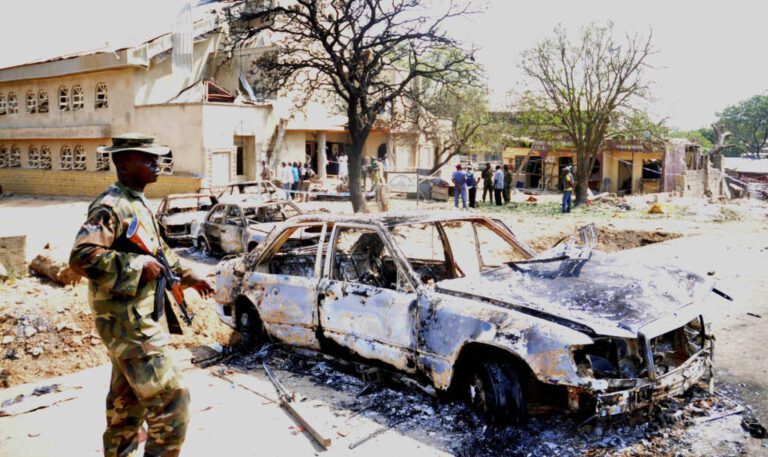Persecution watchdogs are speaking out over President Donald Trump’s decision to designate Nigeria as a country of particular concern. The designation could help pressure the Nigerian government to protect Christians under duress.
Listen to the latest episode of “Quick Start” 👇
Joel Feldkamp, director of international communications for Christian Solidarity International, told CBN News that Nigeria was previously on the U.S. State Department’s list of countries of particular concern, but was later removed by the Biden administration.
Mr. Feldkamp welcomed the country’s redesignation and explained its importance.
“There is a law enacted in 1998 called the International Religious Freedom Act that requires the U.S. government to maintain a list of countries that commit or tolerate serious violations of religious freedom,” he said. “And once a country is on that list, the U.S. government must address violations of religious freedom, including economic sanctions if necessary. Sadly, this list is highly politicized.”
Feldkamp said some countries deserve to be on the list and others don’t, and Nigeria is one of them.
“More Christians are killed for their faith each year in Nigeria than in the rest of the world combined,” he said. “Yet somehow Nigeria is not on this list. As the U.S. Commission on International Religious Freedom said, ‘This is inexplicable.'” So the president’s return to the list is a long overdue step. ”
Feldkamp said experts are waiting to see what Trump will do next. The president issued a statement on his Truth Social account on November 1, threatening action if Nigeria does not take steps to protect Christians.
“If the Nigerian government continues to allow the killing of Christians, there is a good chance that the United States will immediately withdraw aid and assistance to Nigeria and enter the now disgraced country ‘guns-blazing’ to wipe out once and for all the Islamic terrorists who are committing this horrific atrocity,” he said. “I hereby direct the War Department to prepare for possible action. If we attack, it will be as swift, vicious, and sweet as terrorist thugs attack our beloved Christians!”
President Trump called on the Nigerian government to act quickly. Feldkamp said he was intrigued by the president’s statement and wondered what kind of policy process was behind it. According to him, the issue is already making waves in Nigeria.
“I was talking to a Nigerian colleague about an hour ago, and he said, ‘Nigerians are very angry about this. The government is in crisis. They’re looking for a way out,'” Feldkamp said. “It’s a positive situation. It’s a situation where good change can occur.”
However, he said follow-through from the U.S. side is needed and questioned whether military force would be an effective solution to the problem. He said this is not a problem that the United States or other countries can solve with simple bombs and weapons.
Feldkamp also referred to claims in some media outlets that it is unclear whether more Christians than Muslims are actually being slaughtered, which is being closely tracked by CSI and other groups.
“The real group that is actually destroying Christian communities in Nigeria’s Middle Belt is the Fulani militia, which is carrying out a slow-motion campaign of ethnic cleansing, attacking Christian villages one after another, killing anyone they find, driving people out, and burning or occupying villages,” he said. “Slowly over time the map changes, hundreds of old Christian villages all disappearing and being occupied by new people.”
However, he said Boko Haram jihadists were targeting Christians with the aim of establishing an Islamic state. Meanwhile, Fulani militias are attacking believers, and the Nigerian government is reportedly not doing much to stop the massacre, he said.
Feldkamp hopes that President Trump will appoint someone to monitor what is happening in Nigeria so that the United States can enact policies that will help curb these problems.
He said it would be wise for the U.S. to declare penalties such as, “If the attacks continue, there will be penalties, aid will be cut off, and invitations to security meetings will be reduced.”
As the number of voices facing censorship from big tech companies continues to grow, sign up for FaithWire’s daily newsletter and download the CBN News app developed by our parent company to get the latest news from a distinctly Christian perspective.
